Do you ever feel like your money runs out quickly, even before you get your salary? Do you wonder where all your money goes each month? It can be tough trying to have enough money for your needs and wants and not having any savings to rely on.
But there’s something you can do to change this situation and take full control of your money. It’s called budgeting.
Budgeting helps you understand where your money goes and enables you to make informed choices about how you spend it. With a budget, you can start saving money, investing, and building a strong financial foundation for your future.
Whether you’re trying to save money, pay off your debts, or invest in building wealth for your future, this guide will show you 6 practical steps to take in creating a personal budget that works for you.
The following are the steps:
1. Assessing your financial situation
2. Setting SMART financial goals
3. Creating spending categories
4. Allocating income to categories
5. Tracking your expenses
6. Reviewing and adjusting your budget.
So, if you’re ready to change your financial situation and gain control over your money, let’s dive into the world of personal budgeting in Nigeria.
How to create a personal budget and save money: 6 steps to follow
1. Assess your financial situation
Gather all relevant financial information: Collect documents such as bank statements, pay slips, and bills to understand your income, expenses, debts, and savings.
Determine your income
Identify all sources of income, including salary, freelance work, allowances, etc.
Subtract taxes and other necessary deductions from your total income to calculate your net income. For example, if your monthly salary is N100,000 and your tax deductions amount to N20,000, your net income is N80,000.
This will give you an idea of the amount of money you can assign to expenses and savings.
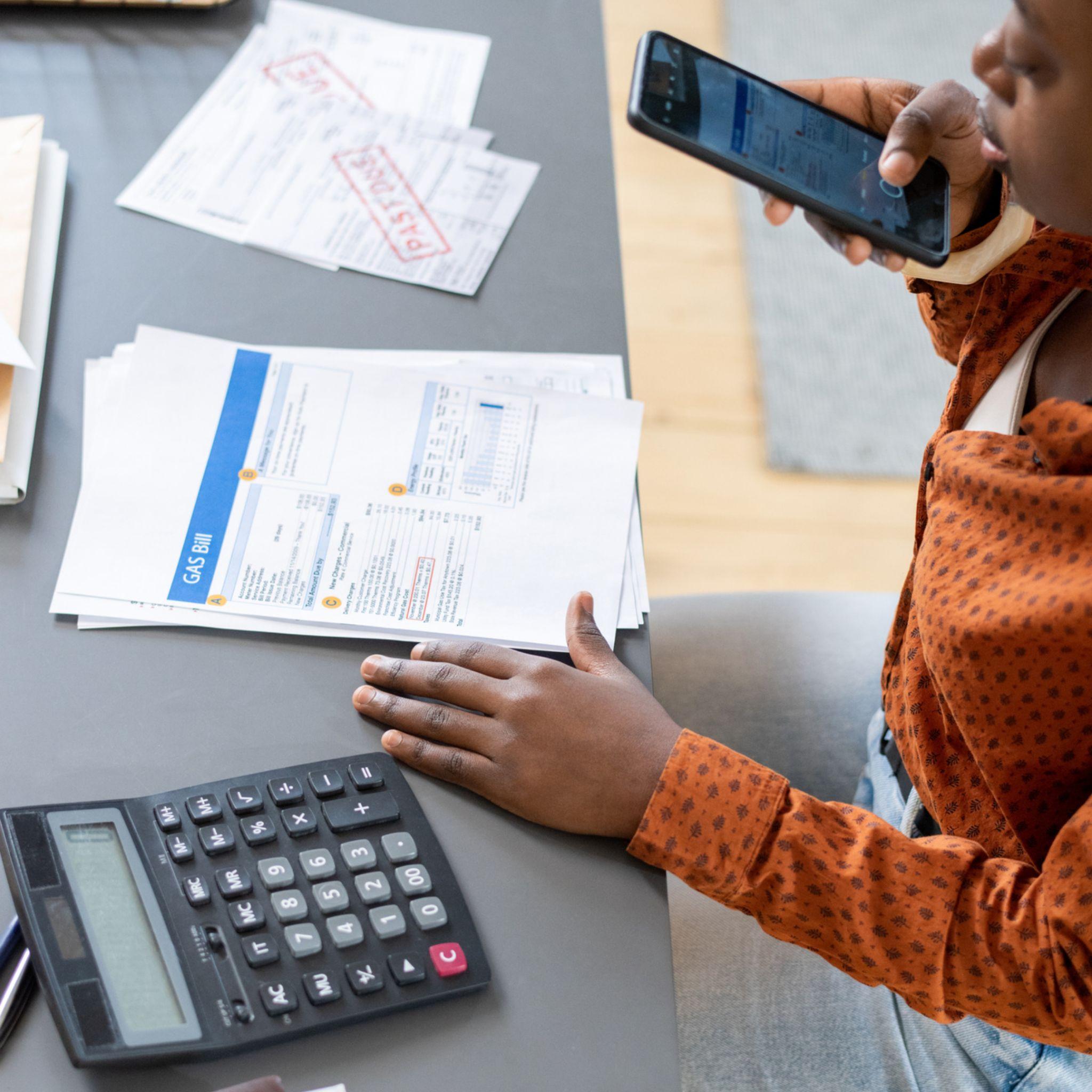
Identify your expenses
Make a comprehensive list of your monthly expenses. Classify them as fixed, variable, or one-time expenses.
Fixed expenses are the expenses you have to make on a monthly basis, like rent and electricity bills. On the other hand, variable expenses are expenses that can change in amount and frequency; examples are hanging out, entertainment, etc.
One-time expenses are expenses that don’t occur regularly, such as buying furniture or paying for a medical procedure such as tooth extraction.
Evaluate your debt
To evaluate your debt, gather information about your debts, including balances, interest rates, and minimum payments. List them out and calculate your total debt amount.
Assess the interest rates and minimum payments to understand their impact on your finances.
2. Set SMART financial goals
These goals help you know what exactly you want to do with your money and how you intend to achieve it. These may include saving for emergencies, clearing debt, or saving for a specific purchase. With SMART goals you’ll stay focused on your plans and fixed timeline. SMART is an acronym for specific, measurable, attainable/achievable, relevant, and time-bound.
How to set a SMART financial goal
Here’s a breakdown of each component and how you can apply them to your financial goals:
- Specific: Clearly define what you want to achieve. Be specific about the outcome you desire and avoid vague statements. Example: Instead of saying, “I want to save money,” a specific goal would be, “I want to save N100,000 for a down payment on a new car.”
- Measurable: Set goals that can be measured in quantifiable terms. So, instead of saying, “I want to reduce my debt,” a measurable goal would be, “I want to pay off N50,000 of debt within the next 6 months.”
- Achievable: Ensure that your goals are realistic and attainable based on your current financial situation. Example: If you earn N200,000 monthly, setting a goal to save N500,000 in 3 months may not be achievable. Instead, set a goal that is realistic by opting to save N300,000 in 3 months.
- Relevant: Make sure your financial goals match your plans. If your long-term plan is to start a business, a relevant financial goal might be to save a specific amount of money for initial startup costs.
- Time-bound: Set a precise/clear timeline/timeframe for accomplishing your goal. This will help keep you on track and push you to take necessary action. Example: Instead of saying, “I want to save money for retirement,” a time-bound goal would be, “I want to contribute N10,000 per month to my retirement account for the next 30 years.”
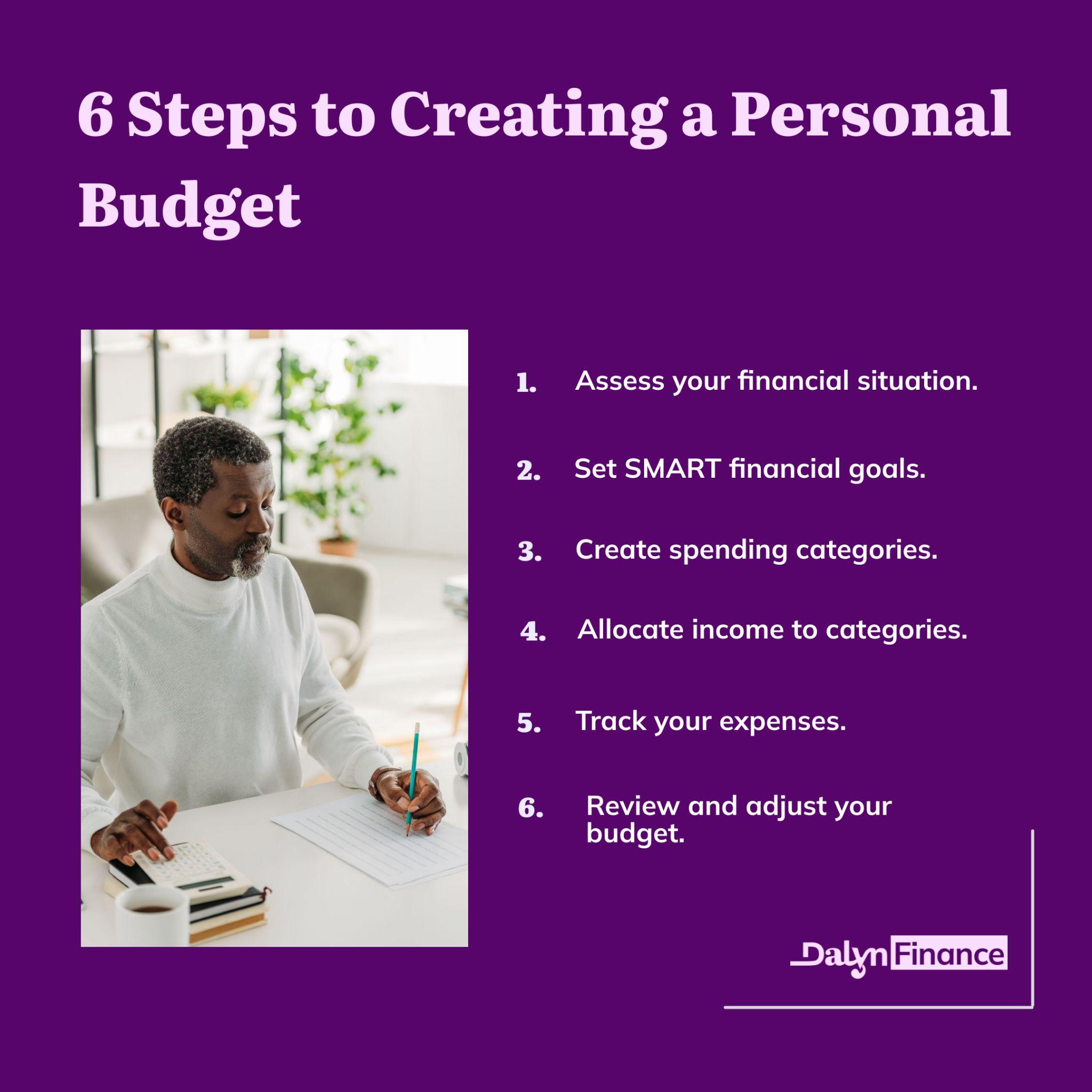
Types of goals
Your goals may be either short or long-term. Short-term and long-term goals refer to different timeframes for achieving specific financial objectives.
Long-term goals involve more extensive planning and span over a more extended period, while short-term goals are more immediate objectives that act as building blocks to achieving these long-term plans.
For instance, your long-term goal may be to accumulate N1,200,000 for your new business in 5 years. To support this goal, your short-term goal can be to save N20,000 every month solely for this project. So, when learning how to create a personal budget, each goal, whether short-term or long-term, should be SMART.
3. Create spending categories
Creating spending categories involves identifying and organizing your expenses into specific groups. Here’s a step-by-step process to help you create spending categories:
- Review your expenses: Start by reviewing your bank statements and receipts. Categorize your expenses based on the nature of each transaction.
- Identify major expense areas: Identify the major areas where you spend the most money. These may include housing, transportation, food, debt repayments, entertainment, education, and personal care.
- Break down major categories into subcategories: This will provide more detailed insights into your spending habits and help you allocate your budget more effectively. Examples include:
- Housing: Rent, electricity bills, maintenance, land use charges, insurance
- Transportation: Fuel, public transportation, car maintenance, insurance, parking
- Debt repayments: loan repayments
- Entertainment: Dining out, movies, concerts, hobbies, subscriptions
- Healthcare: Insurance premiums, medical bills, prescriptions
- Education: School fees, books, materials
- Personal care: Haircuts, beauty products, toiletries.
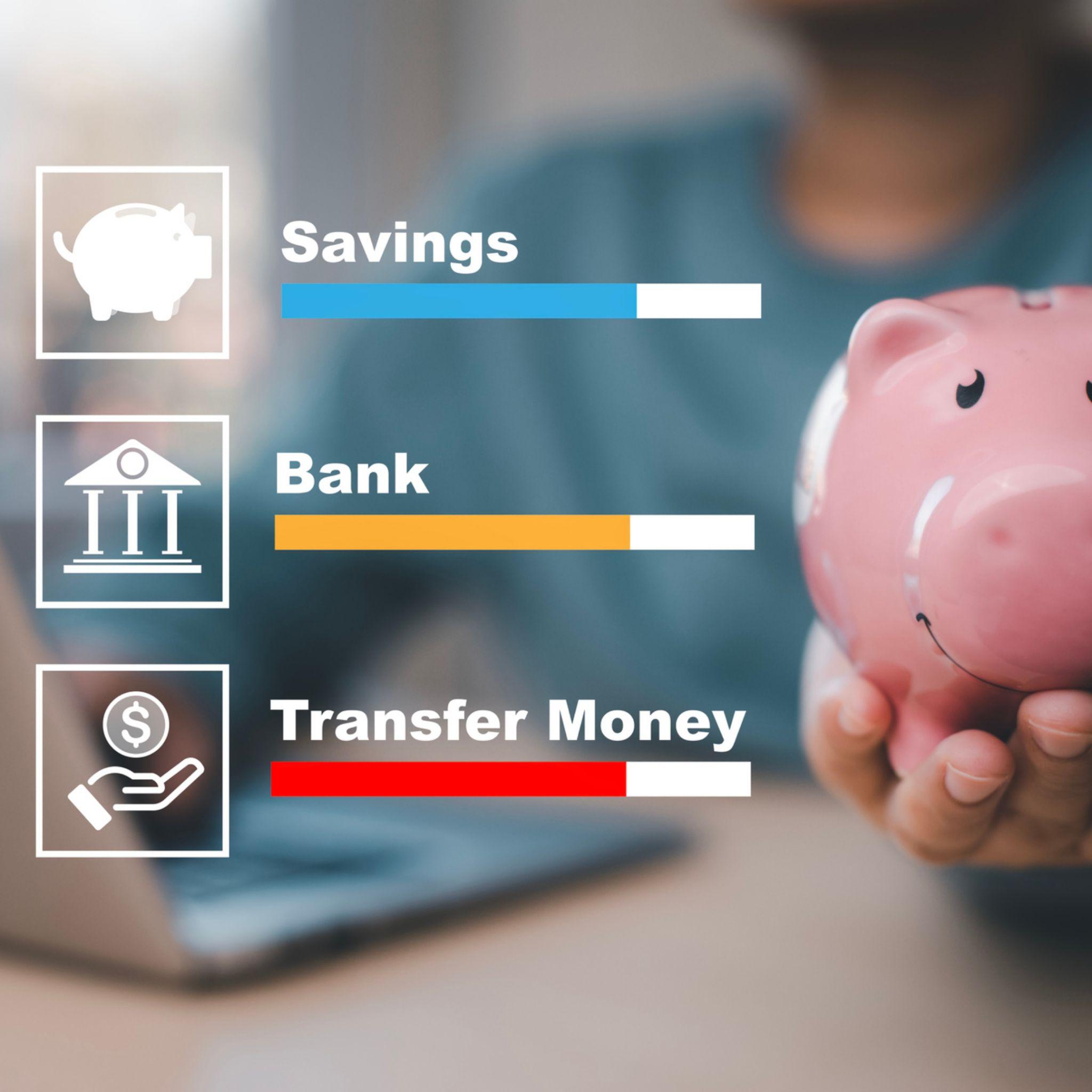
- Customize categories to fit your lifestyle: Add or remove categories as needed to accurately reflect your expenses. Regardless of the common categories you may find in a typical budget, it is important to personalize your categories to suit your current situation. For example, instead of having a category like “car expenses” when you’re yet to even buy a car, you can switch to “transport fare.”
- Consider tracking methods: Determine the best method for tracking your expenses within each category. This can be done through budgeting apps, spreadsheets, or personal finance software. Start tracking your expenses within each category to see how much you spend in each area.
- Review and refine categories: Periodically review your spending categories to ensure they still align with your current financial situation and goals. You may choose to do it bi-monthly, monthly, quarterly (every 3 months), or as the need arises.
4. Allocate income to categories
Determine the amount of your income to be allocated to each budget category. Start with basic expenses and prioritize based on your goals and values. Ensure your total budgeted expenses do not exceed your income.
Let’s assume your monthly income is N100,000. Allocate 30% of your income to housing, 15% to transportation, 20% to foodstuff, 10% to debt repayments, 10% to savings, 10% to entertainment, and 5% to healthcare.
5. Track your expenses
Keep a record of all your expenses. Here’s how you can track your expenses:
- Choose a tracking method: You can use a spreadsheet, a budgeting app (e.g. MyMoney), or even a simple notebook to record your expenses.
- Record your expenses: Whenever you spend money, make a note of the expense, the date, the amount, and the category it belongs to. Include all expenses, no matter how small. Even insignificant expenses can add up over time and impact your budget.
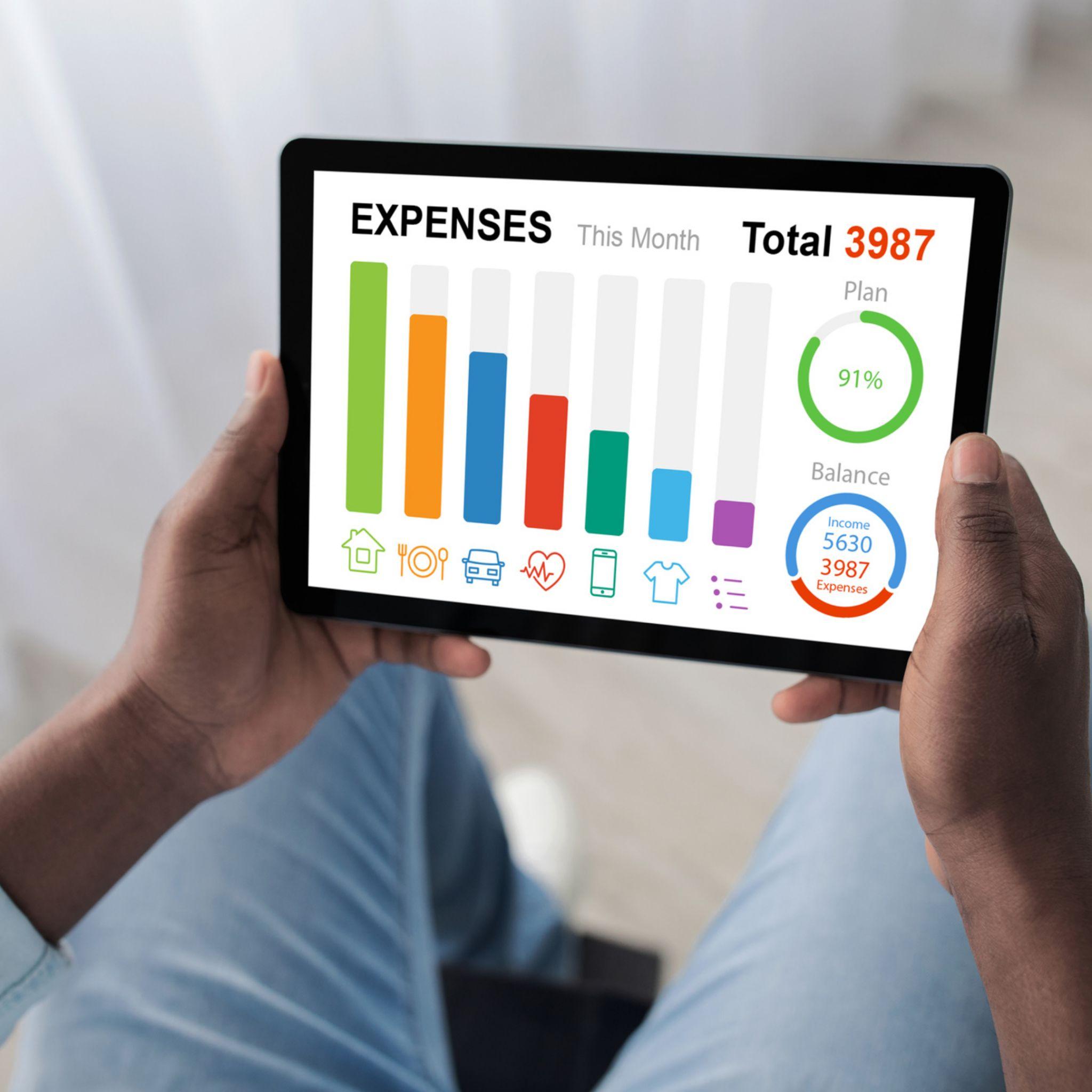
6. Review and adjust regularly
Check your recorded expenses. Identify areas where you may be overspending. Check your progress, and identify areas for improvement.
A sample of a personal budget
Here’s a sample budget to give you an idea of how to create a personal budget. This budget is based on a monthly income of N100,000. Remember, this is just an example, and you should customize your budget based on your income, expenses, and financial goals.
|
Expense Category |
Subcategory |
Percentage of income |
Amount |
|---|---|---|---|
|
Housing |
rent, property maintenance, and electricity bills associated with your housing |
30% |
N30,000 |
|
Transportation |
fuel, public transportation fares, vehicle maintenance, or car loan payments |
15% |
N15,000 |
|
Food |
foodstuff and household essentials |
20% |
N20,000 |
|
Debt repayments |
personal loans, or student loans |
10% |
N10,000 |
|
Savings |
emergency fund, future investments, education |
10% |
N10,000 |
|
Entertainment |
leisure activities, hanging out, hobbies |
10% |
N10,000 |
|
Healthcare |
health insurance, medical check-ups, prescription medications |
5% |
N5,000 |
|
Total |
100% |
N100,000 |
Budgeting tools
When it comes to learning how to create a personal budget, there are various tools available that can simplify the process and help you stay organized. Here are some commonly used tools to consider:
- Spreadsheet: Programs like Microsoft Excel or Google Sheets provide a flexible and customizable platform for creating your budget. You can create different sheets for income, expenses, and savings, and use formulas to automatically calculate totals and track your progress.
- Budgeting apps: Many apps are available on mobile phones that can help you track and manage your income and expenses without stress. Examples include MyMoney, Mint, and PocketGuard.
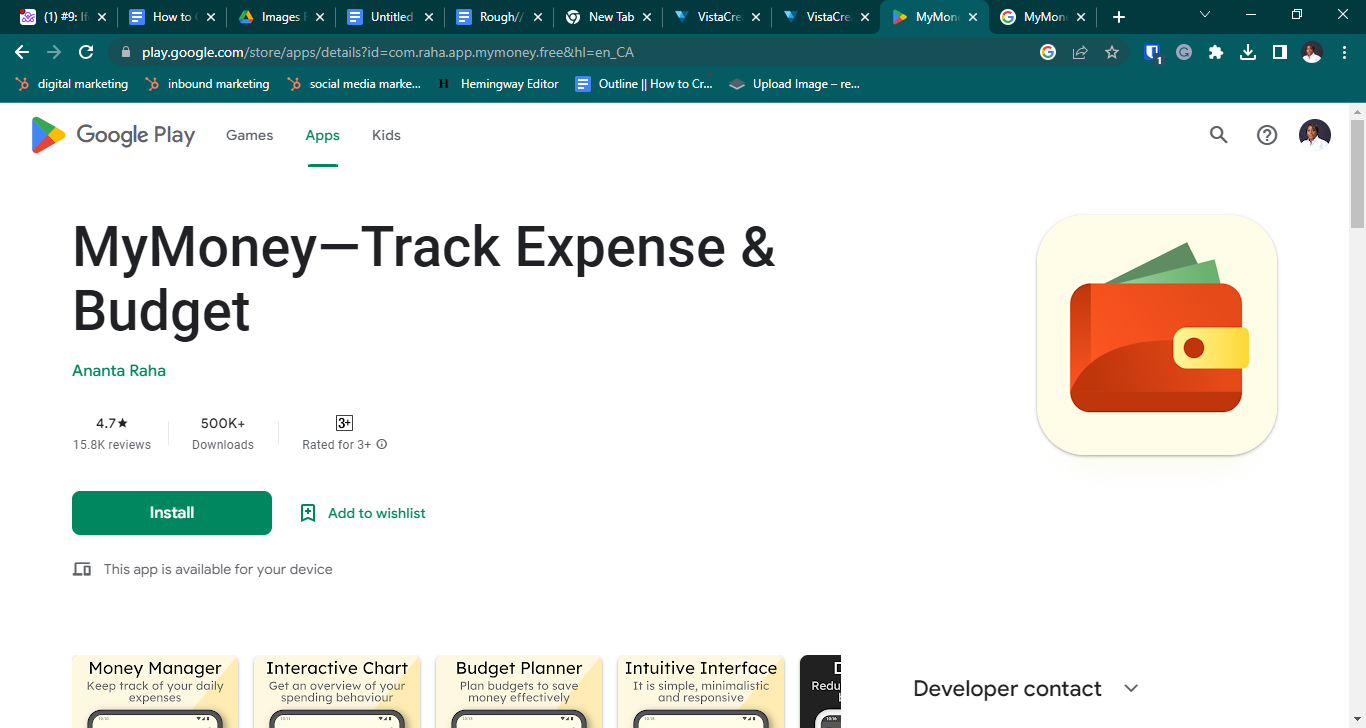
Source: Google Play
- Envelope system: The envelope system is a traditional method where you assign physical envelopes to different spending categories. You allocate cash to each envelope and only spend from the designated envelope for its specific category. This method helps you visualize your spending and limit overspending.
- Online banking: Many banks now provide online platforms with built-in budgeting features. These platforms allow you to categorize transactions, set spending limits, and track your expenses directly within your bank account interface.
- Pen and paper: If you prefer a more traditional approach, you can use a simple notebook or a budgeting template to manually record your income and expenses. This method may not offer the convenience of automated calculations.
How to choose a budgeting system
A budgeting system refers to the approach or method used to create and manage a budget. It involves the processes, tools, and techniques used to track income, expenses, and savings when learning how to create a personal budget.
Here are a few points to consider when choosing a budgeting system:
- Goals and objectives: Identify what you wish to do with your budget. It can be saving for a particular item, clearing debt, or building an emergency fund.
- Simplicity and ease of use: Choose a system that fits your level of financial literacy and is easy for you to implement and maintain.

- Flexibility and adaptability: Life circumstances and financial situations can change, so it’s important to choose a system that can be modified to accommodate new circumstances without causing unnecessary stress or disruption.
- Compatibility with lifestyle: Consider how well the budgeting system aligns with your lifestyle and spending habits. Some systems may be a better fit for individuals with irregular income or fluctuating expenses, while others may work well for those with a consistent financial situation.
- Accountability and motivation: Determine whether the budgeting system provides built-in accountability measures, such as daily reminders.
- Long-term sustainability: It should be a system that you can sustain over a period without feeling discouraged.
Tips for sticking to your budget
1. Consider factors that can affect your budget
In Nigeria, where the cost of living fluctuates, it’s important to consider these factors when estimating future expenses and trying to figure how to create a personal budget.
Example: If you anticipate a 5% increase in food prices due to inflation, fix your budget accordingly by increasing the allocated amount for food by 5%.
2. Automate your savings
Set a fixed amount to be automatically transferred from your salary account to your savings. That way, you save without even thinking about it. Using a savings app like piggy vest also makes it easier.
3. Set realistic goals
Your goals should be clear and attainable. It makes no sense to set a savings goal of N60,000 per month when you earn N100,000 and spend over N20,000 on just transportation. Setting realistic goals will help you stay motivated and reduce unnecessary pressure.
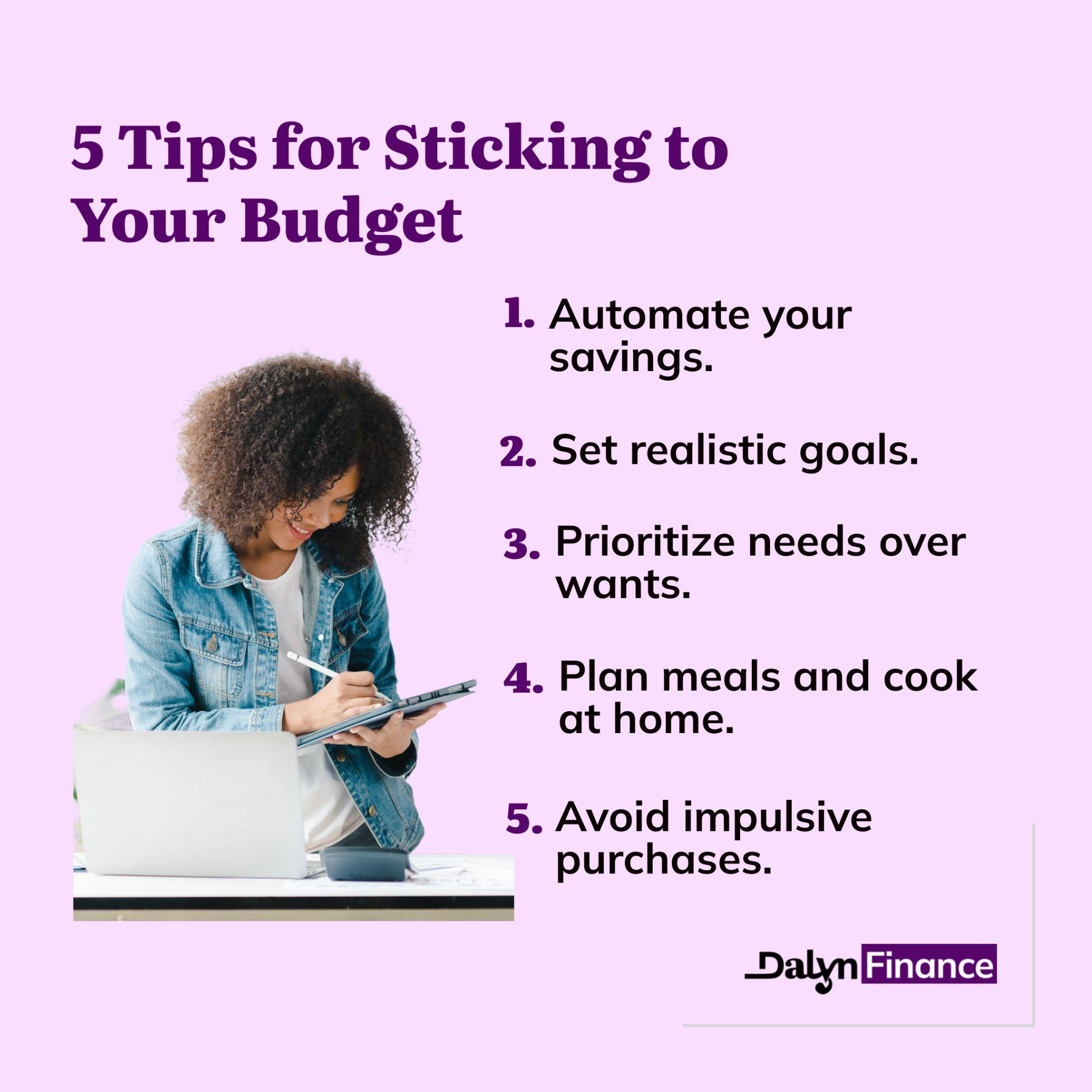
4. Prioritize needs over wants
Differentiate between your basic needs—those you can’t live without like food—and your wants. Wants are optional things that you can survive without, like going to the cinema. Ensure you cover those essentials before throwing in other things you desire.
5. Plan meals and cook at home
Cooking your own food at home is not only healthier but more cost-effective as compared to eating out regularly. You can create a weekly menu for yourself showing what you can have for breakfast, lunch, and dinner for the week. That way, you don’t get stuck thinking about what to make.
6. Avoid impulsive purchases
Before buying something that was not originally on your list, think of what it would do to your budget for the month. Give yourself time, possibly sleep over it, and you’ll see you’d most likely wake up not remembering why you even need it.
What is a budget?
A budget is a plan that shows you how much money you have and how you should spend it. With it, you plan and allocate your money for different things in your life.
Let’s say you receive pocket money from your parents or you earn a monthly salary. With a budget, you can decide how much of that money you want to save, spend on things you need, or invest for future returns.
What is a personal budget?
A personal budget is a special plan for your money. It’s not a type of budget on its own; instead, it’s the budget you create for your personal finance.
It involves allocating income, setting spending limits, prioritizing expenses, and making conscious decisions about saving and investing based on personal financial goals. This can cover various timeframes, such as monthly, quarterly, or yearly.
Why you need a personal budget
A personal budget can help you:
- Track your expenses to ensure you don’t spend unnecessarily.
- Know where your money is going and areas where you can reduce spending.
- Pay off debts you owe and become free.
- Save and invest for future expenses and emergencies.
- Stay motivated and achieve your financial goals.
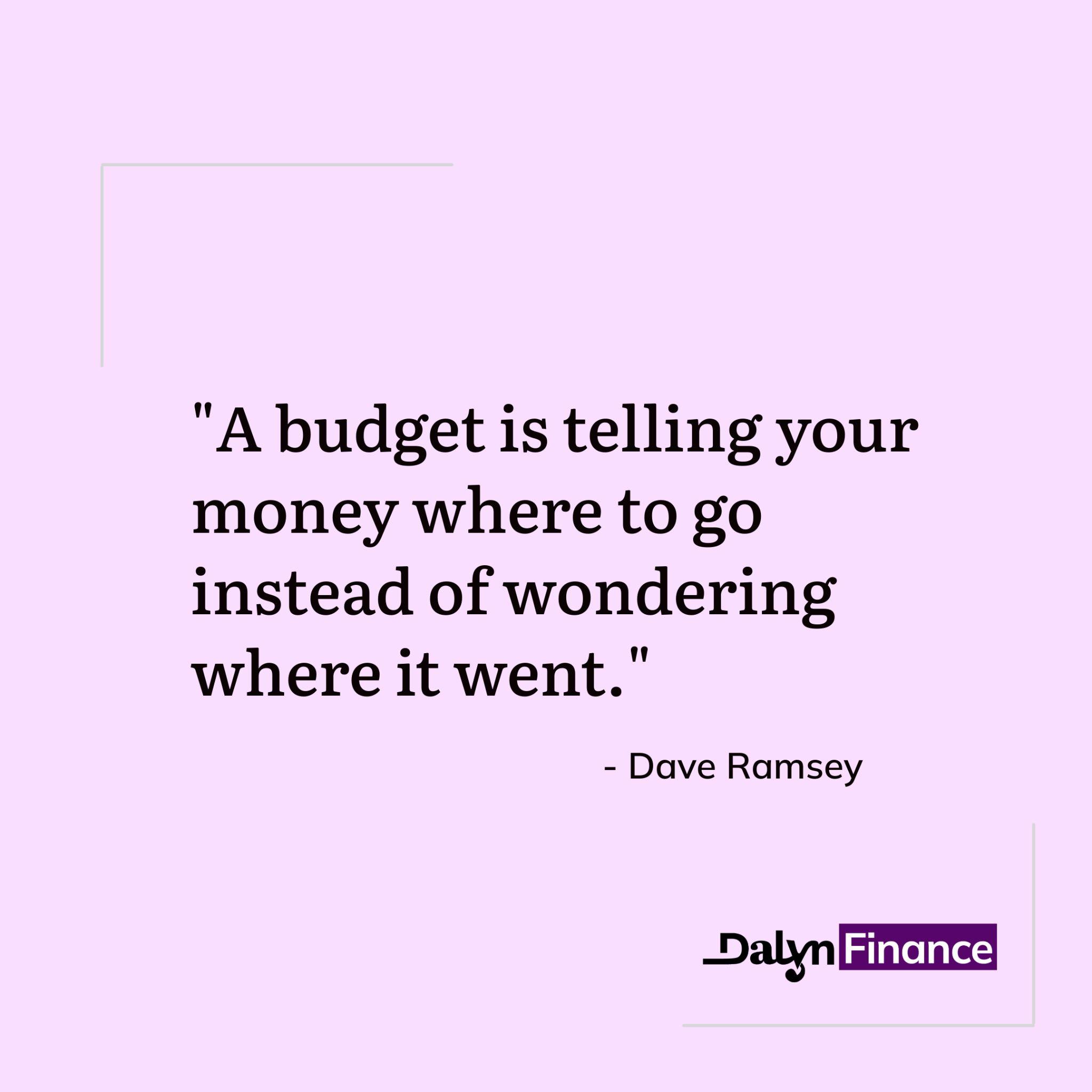
Conclusion
Creating and maintaining a personal budget is a powerful strategy that can transform your financial life. By following the practical steps outlined in this comprehensive guide, you can take control of your money, track your expenses, and achieve your financial goals. From understanding your income and expenses to setting SMART financial goals, from allocating funds to different spending categories to tracking your progress, this guide has provided you with the necessary knowledge and strategies to learn how to create a personal budget that works for you.
Remember, budgeting is not a one-time task but an ongoing process. Regularly review and adjust your budget as your circumstances change. Be disciplined, stay committed, and make informed financial decisions. Say goodbye to financial stress and hello to financial freedom by creating your personal budget today.




